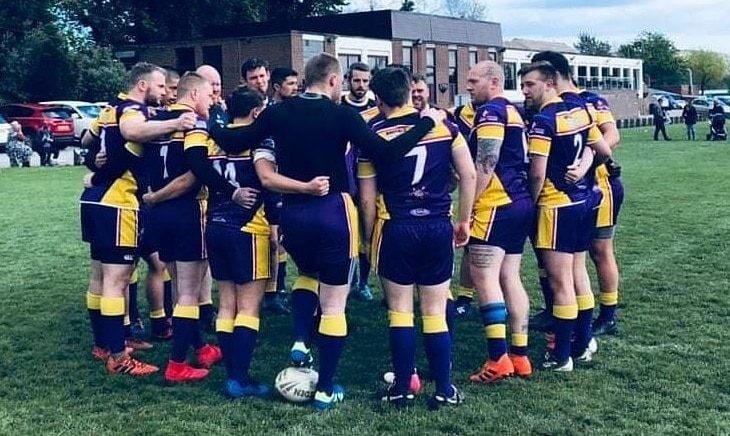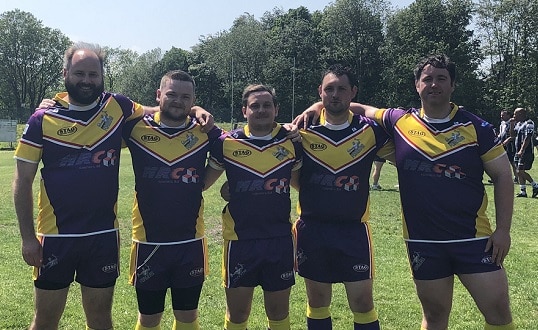Written by Zack Wilson
Rugby league coaching in development areas can be a very different experience to coaching in heartland areas.
At the grassroots in places where there is no history of our sport and its culture has not penetrated, clubs have to work hard to persuade people to try our game.
In places such as Scotland, Ireland, Canada, the USA and other places in Europe and Africa, the main place that clubs have to look for players is in rugby union.
The other code has managed to put down roots in most of the places that rugby league is currently attempting to grow.
In many of those places, particularly the Celtic countries of Scotland, Wales and Ireland, the main source of players is rugby union.
While it is possible to bring in complete novices, or players from sports such as soccer, the bulk of players who turn out in the 13-man code in places like Edinburgh, Dublin or Sheffield are blokes who grew up playing union.
This offers grassroots coaches some advantages. The basic skills of the sport are pretty much the same, after all, when it comes to things like catching, kicking and passing.
Certain things translate well across both codes too, such as running the right lines and timing a pass.
But the devil is in the detail. Players always develop habits during their sporting careers.
Many of the habits that are picked up by rugby union players as youngsters can present problems when they take to the rugby league field.
One coach working at grassroots level with a squad packed full of code-jumping rugby union players is Paul McDermott.
The former York, Sheffield Eagles and Wakefield Trinity loose forward is working with expansion side Sheffield Forgers this season.

A big part of his role at the club is to turn rugby union players with potential into proper rugby league players.
“The biggest attribute they have to have is attitude,” he said.
“If they have an attitude where they do want to do well in rugby league.
“Rugby league players can do far more than rugby union players, in union you have a role to play and you can’t really go outside that role.
“But if they’re asking me detailed questions then it means that they’re interested in progressing.
“And the other one is their attitude in training, that they get stuck in. If they’ve got that, you can work on them.
“Whether they’ve got the ability to change over is a different matter, of course.
“You’ve got to identify a role for them and they’ve got to accept that.
“At the Forgers, I’ve been very pleasantly surprised by the way the whole lot of the rugby union players are wanting to become better rugby league players, and it’s not just an exercise in fitness for them.”
“It goes back to attitude, because they’ve been brought up to think rugby union is chess and rugby league is draughts.
“There’s a lot of little things – for example, rugby union forwards are used to going in, not having to make any real physical contact, and then it’s other lads who come in and bash the opposition off the ball, and it’s once every ten minutes.
“So they have this perception that rugby league is a very simple game to play – it isn’t, by any means.”
McDermott also feels that union players often need to get used to executing under more pressure, with that pressure often due to something as simple as having two fewer players per team on the pitch.
“Mistakes made in rugby league tend to be more serious than in rugby union,” he added.
“The thing that rugby league gives to players is an individual responsibility for their own game.
“Anybody at any time in rugby league can make a big difference to a game, whether you’re tackling, defending, talking or moving into space.”
Another coach who has had to convert plenty of rugby union players is Barry McGuffog.
The Cumbrian with the Scottish roots is currently the head coach of Edinburgh Eagles, the team from the Scottish capital who are playing in the North East England structure.
He highlights the importance of having players from a rugby league background as a central part of the group at expansion clubs.
They set the example that the cross-code converts can then follow.
“A lot of our guys are from a rugby union background, and still play rugby union through the winter.
“We are adding the league experience to the team. Just by natural migration of people – we’ve got a couple of lads from Yorkshire who have been playing for us.
“Those who have come through rugby union, and have gone on to represent Scotland at rugby league while playing for our club, and the lads from Yorkshire are bringing on the lads who are lack the experience.
“It’s the intensity, the getting back 10 metres, every time – it’s a bit of a shock to them to start with.
“But a lot of them do see the benefit – it’s not the focus for what we’re trying to achieve- but they do see the benefits when they go back to rugby union season.
“They’re well up on the pace ahead of preseason.”
McGuffog uses the incentive of improving fitness and learning new skills as a way of convincing rugby union players to try our code.
“Very much so,” he added.
“It’s teaching them. The way we look at it is that we’re not ‘upskilling’ people, we’re teaching them a different set of skills that will be an advantage in their union game.
“And it’s just getting over that barrier of ‘us and them’.
That barrier can still be a real obstacle to developing the game and finding players, McGuffog revealed.
While rugby league clubs in new areas need to attract recruits from the other code, union clubs can be less keen about allowing ‘their’ players to play league.
There is still a hangover from the days when union players could get life bans for even drinking in the bar at a rugby league club.
“Yes, without wanting to get too political, we have had differences of opinion at amateur level between different clubs as to whether rugby league is a rival,” McGuffog asserted.
“But if union clubs are not keen on their players playing league, that’s a concern for them, not for me and not for us as a sport.”
If union players can overcome those social barriers and do try rugby league, their journey is only just beginning.
While good rugby players can always adapt to both codes, as has been shown over the years, rugby league places different demands on a player to union.
Another man who has had to work hard over the last two years at converting players is Chris Coates.

The former Wakefield Trinity youth player is head coach of the Sheffield Forgers, sponsored by Everything Rugby League.
“The intensity is really hard,” he said.
“One of the primary things when you’re jumping from rugby union to rugby league is that there’s a nice gentlemanly atmosphere in rugby union.
“In rugby league that doesn’t happen, and you’ve got to be intense and aggressive all the way through.”
Building the resilience and skill set needed to cope with that rugby league intensity is not a simple process, nor do improvements happen overnight.
As with anything, repetition and drills are what instil and then hone the rugby league specific skills that are required by the new convert.
“It’s technique, it’s reps, and then after that it’s fitness,” Coates explained.
“As much as you work on skill, once you start to tire you go back to what you were taught as a kid.
“Because you were taught things as a child, once you tire you go back to them.
“If you just ran the ball lots as a child, that’s all you will be able to do as an adult.”
That fitness demand that is placed on rugby league players is something that is also considered important by Paul McDermott.
The former York man also believes that union players too often underestimate the technical as well as the physical demands of the 13-man code.
“One hard thing that the rugby union players at Sheffield Forgers have found is that constantly moving back 10 metres,” he said.
“It doesn’t sound a lot, but it’s the type of fitness demands they struggle with.
“It’s easier to move, though, in my opinion, from rugby union to rugby league than it is to move from rugby league to rugby union.”
What is clear is that jumping between the two codes of rugby is not easy, and coaching players from union to play league is far from a simple process.
As our game expands across the world, we are going to be picking up more converts from rugby union.
Grassroots coaches need to be prepared to coach these players so that they can adapt to rugby league as quickly as possible.
There are no manuals or guides on how to convert players at the grassroots level, coaches are largely left to make things up as they go along.
Given that expansion into North America might see us pick up converts from the world’s other great handling code, American football, the work done by grassroots coaches will become increasingly important.
Be the first to comment on this article